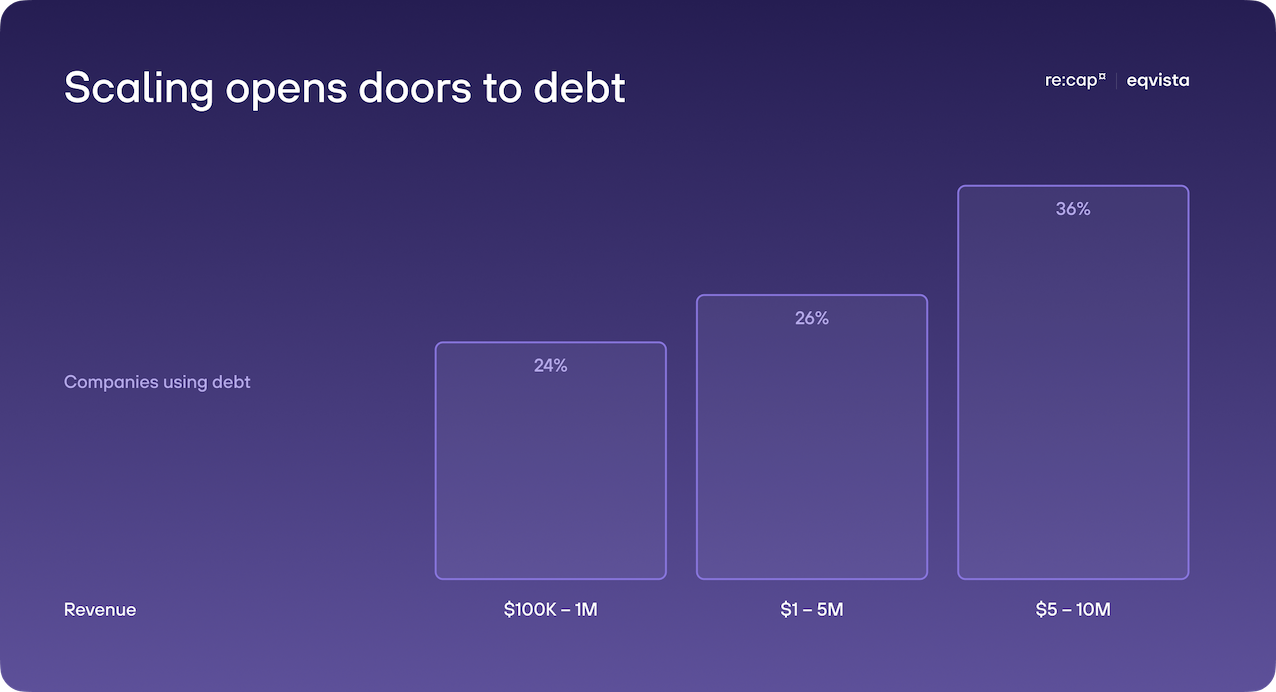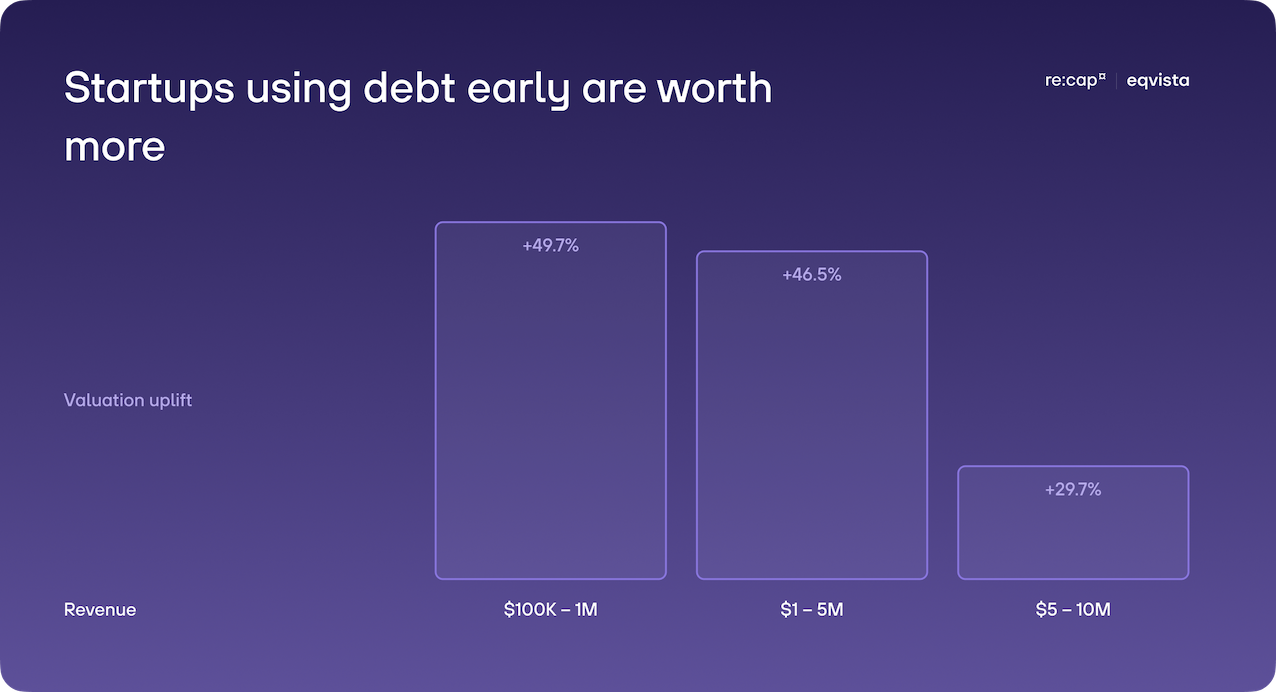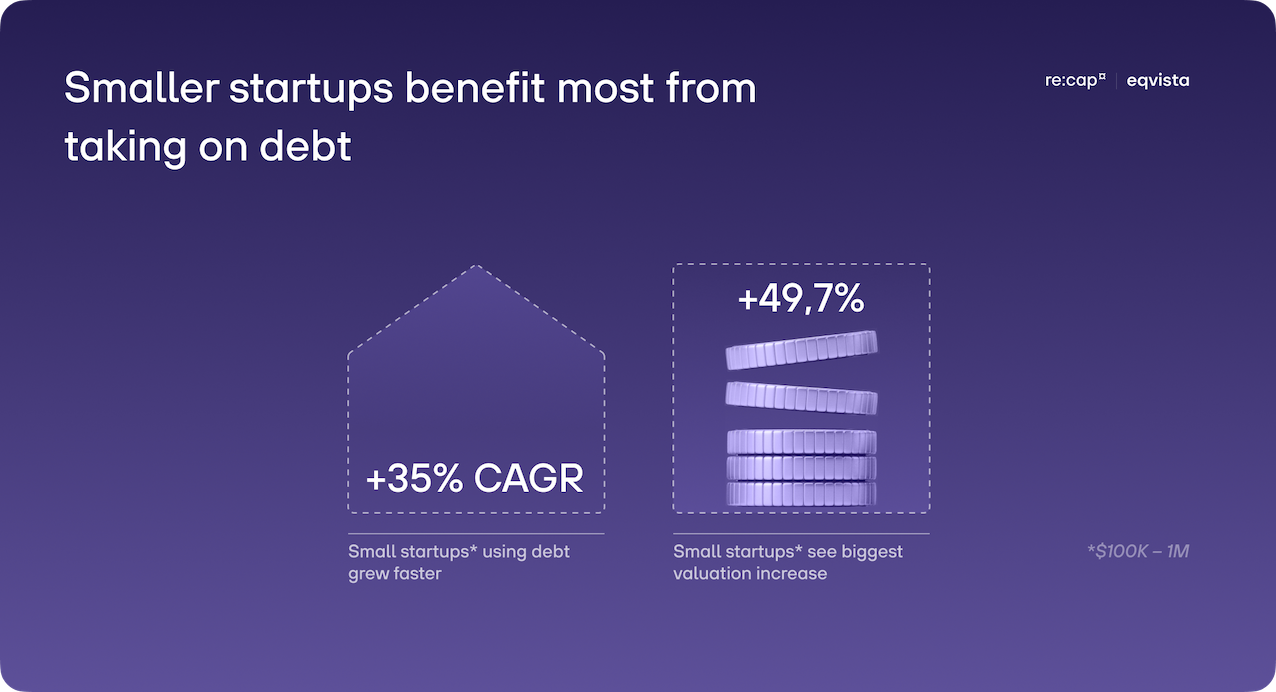Many startups treat debt like a spare tire – something they ignore until they really need it. Meanwhile, equity tends to steal the spotlight when it comes to startup funding.
Yet, debt funding can be more than just a safety net. When used wisely, it can fill short-term financial gaps, provide room for long-term growth, and help founders retain more equity.
How does debt financing influence startup revenue growth and valuation?
We want to answer this question. In collaboration with our partners at Eqvista, we analyzed:
- 530 early-stage startups (US-focus) from Eqvista’s proprietary startup database
- 1,294 snapshots across revenue, funding, and valuation metrics (from more than 10,000 datapoints) from 2021-2025
- Early-stage startups that are VC-backed, mostly B2B, predominantly tech
The findings reveal a clear trend: companies that strategically use debt tend to grow their revenue more quickly and achieve higher valuations. Debt doesn’t have to be a burden; when managed well, it is a powerful growth tool.
The key takeaway is straightforward: debt shouldn’t be seen as a last resort. Instead, it can be a strategic lever for scaling your business while maintaining control.
We’ll explore how this dynamic plays out across different revenue segments, delve into the reasons behind the numbers, and demonstrate how adding debt into your capital structure can change the narrative from "debt is bad, equity is good" to "both are beneficial".
TL;DR
- Larger startups are more inclined to use debt as it becomes more accessible.
- Startups that leverage debt have seen significantly higher revenue multiples, with medians reaching up to 49.7% more than their counterparts.
- For both founders and investors, using debt reflects discipline, flexibility, and confidence in future growth.
Debt financing designed for startups
£5M, 1-60 months, zero dilution, full control for founders: our funding is designed for startups that want to grow more efficiently.
Calculate your funding termsThe data behind the analysis
The dataset is based on financial information provided by early-stage startups (<$10M ARR) and validated through internal processes to ensure audit-grade credibility.
With this level of detail over a longer period of time, we can assess how startups use debt at different stages of growth. It also shows how debt usage is connected to revenue growth and company valuation across comparable groups of companies.

Finding 1: Scaling a startup opens the door to debt financing
Startups tend to rely more on debt as their revenue increases, and the data clearly shows this trend.
- $100K-1M: 557 companies, 134 with debt (24% adoption)
- $1-5M: 504 companies, 133 with debt (26% adoption)
- $5-10M: 233 companies, 84 with debt (36% adoption)
This gradual increase from 24% to 26% and then to 36% highlights how scaling up makes it easier to access debt.

Why is this important, and what can other startups take away from this?
- Repayment credibility I: Higher revenue means lenders feel more secure that debt can be repayed by the borrower.
- Level of maturity: a certain stage is important so you can access reasonably large amounts of debt and are able to repay them without being crushed by repayments.
- Cash flow visibility: Predictable cash flow makes startups more appealing to lenders and debt investors.
- Product-market clarity: Having traction and PMF simplifies the due diligence process. Startups showing that their business model works and they make money with it, have higher chances to get debt.
- Operational maturity: Well-organized financials and data help lenders with underwriting – especially with alternative lenders that rely on data when doing their DD.
Finding 2: Startups using debt financing at an early stage are seeing higher valuations
In various revenue ranges, businesses that took on debt were valued more favorably than those that didn’t, even when size was taken into account. The valuation uplift for different revenue brackets was:
- $100K-1M: +49.7%
- $1-5M: +46.5%
- $5-10M: +29.7%
We define valuation uplift as the percentage by which the median revenue multiple of debt-using companies exceeds that of non-debt peers within the same revenue bracket.

Why is this significant, and what can other startups learn from it?
- Less dilution: Founders can keep more of their equity, increasing the value per share and causing less dilution.
- Confidence signaling: Taking on debt shows that a company is managing its capital wisely and has control over spending.
- Growth on demand: Debt allows for growth without having to wait for equity funding.
- Capital efficiency: Streamlined operations often attract investor interest.
These figures are not just numbers. For instance, in the $100K-1M range, a business valued at $4.2M without debt could be worth over $6M with it. That’s a substantial increase in company value, achieved by rethinking capital structure.
Finding 3: Smaller companies benefit most from taking on debt
In the $100K-1M revenue range:
- Companies that utilized debt experienced slightly faster growth (35.0% CAGR compared to 34.2% overall).
- These companies also saw the largest increase in valuation (+49.7%).
This indicates that debt isn't solely for established, large enterprises. It can also assist early-stage startups in accelerating growth while boosting investor confidence.
Regression analysis backs this up: even after accounting for total capital raised, companies with debt demonstrated a positive correlation with revenue growth across all segments.

Founders & investors: why debt matters
For founders
Debt shouldn't be viewed as a weakness or missing momentum. It can be used as a leverage tool. It allows you to move quickly without giving up equity. It enables you to achieve stronger metrics before seeking additional funding and keeps the power in negotiations on your side.
For instance, in the $100K-1M range, startups that took on debt grew more rapidly and received higher valuation multiples.
For investors
Debt reflects discipline. Founders who embrace it demonstrate their ability to manage repayments, plan and forecast their cash flow, and create a balanced capital structure. This is a sign of operational maturity rather than desperation.
Lenders are more selective – but the rules are clearer
Startups that want to fund their business with debt need to stick to clear rules and present reliable and strong numbers. There are no gut feelings involved. It is a matter-of-fact approach based on data.
The ideal time to secure debt is long before you find yourself in urgent need of it. Ideally, you want it when you need it least. Acquiring debt from a position of strength conveys confidence and enhances flexibility.
Preparation is key in debt financing
- Maintain clean financial records
- Provide a forecast that shows what you want to do with the funding
- Ensure founders know their numbers by heart
Lenders are cautious but tend to favor debt for startups that exhibit realistic cash flow and repayment capabilities.
The data from 530 early-stage startups indicates:
- Debt usage increases with company maturity: from 24% in startups under $1M to 36% in those between $5-10M.
- Debt is associated with higher valuations: up to a +49.7% increase in early-stage firms.
- Smaller companies gain the most: they experience faster growth (35% CAGR) and stronger valuation multiples.
- Regression analysis confirms: debt is consistently linked to higher growth, even when controlling for total capital raised.
Key takeaways
Smart founders don’t wait until they’re at a tight spot to consider debt. They use it early and strategically. It helps them to preserve equity, accelerate growth, and shows investors they run a disciplined business.
- Scaling a startup opens the door to debt financing. Once a company gains traction and has stable revenue it becomes more likely using debt as funding source.
- Startups using debt financing at an early stage are seeing higher valuations. Often, they are more discipline and numbers driven – which benefits the business.
- Smaller companies benefit most from taking on debt: So debt doesn't benefit large companies solely.
Q&A: Startup debt financing
What is debt financing for startups?
Debt financing is when a startup borrows money, through bank loans, venture debt, or alternative lenders, that must be repaid over time with interest. Unlike equity financing, it doesn’t require giving up ownership. This makes it a useful tool for founders who want to fund growth while keeping control of their company.
When should startups consider debt financing?
Startups should consider debt financing when they’ve reached a level of stability and predictability. Key signals include:
- Growing revenue that shows repayment capacity.
- Reliable cash flow that lenders can trust.
- Product-market fit that proves the business model works.
- Organized financials that make due diligence easier.
Debt is often more accessible as a startup matures, but even young companies can use it strategically if their fundamentals are solid.
How does debt financing affect valuation?
Debt can strengthen a startup’s valuation by reducing dilution and signaling capital discipline. With debt in place, founders keep more equity, which increases the value of each share. Investors may also view the company more favorably if debt is used responsibly, since it shows the team can manage capital efficiently.
Why can debt be valuable for early-stage startups?
Debt isn’t just for large or later-stage businesses. Early-stage startups can benefit by:
- Accelerating growth before the next equity round.
- Preserving equity while building stronger metrics.
- Improving negotiation power with investors by showing progress without heavy dilution.
For smaller startups, even a modest loan can make a meaningful difference in scaling faster.
What are the advantages of debt financing for founders?
- Keep more ownership compared to equity rounds.
- Grow faster without waiting for the next fundraising cycle.
- Increase investor confidence by showing financial discipline.
- Balanced funding structure with a mix of debt and equity.
Used wisely, debt can become a growth enabler rather than a burden.
How do investors view debt financing in startups?
Investors generally see well-structured debt as a positive signal. It shows that:
- The business has strong enough fundamentals to qualify for lending.
- Founders are thoughtful about capital efficiency.
- The company is capable of planning ahead and managing repayment obligations.
Debt, when used strategically, reflects maturity rather than weakness.
What should startups prepare before applying for debt financing?
To secure debt successfully, startups should:
- Maintain clean, transparent financial records.
- Build a clear growth plan showing how the funds will be used.
- Demonstrate repayment ability through predictable cash flow.
- Understand key metrics and be ready to present them to lenders.
The best time to raise debt is from a position of strength, not urgency.
Is debt financing right for every startup?
Not always. Debt works best for startups with stable or growing revenue and a clear path to repayment. For very early-stage or pre-revenue companies, equity financing may be a better fit. But when timed correctly, debt can preserve ownership, support growth, and improve investor perception.
Debt financing designed for startups
£5M, 1-60 months, zero dilution, full control for founders: our funding is designed for startups that want to grow more efficiently.
Calculate your funding terms

.gif)








